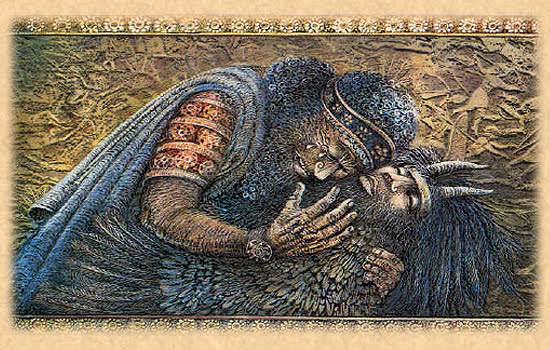Conventions of the Elegy

"How long did I slap your corpse-face
to drive a summer into its ice?
Forgive me.
But, O, Enkidu,
how am I to know myself without you?"
— from Gilgamesh, translated by Derrek Hines
The usual definiton of an elegy is, "A poem of serious reflection, typically a lament for the dead," or, in a more specific setting, "(in Greek and Roman poetry) a poem written in elegiac couplets, as notably by Catullus and Propertius." But the first is both too general and too specific, while the second limits itself to a very specific meter, one not seen in contemporary poetry. So I like Peter Sacks' definition for its inclusiveness and consideration. According to him, an elegy is "a poem of mortal loss and consolation."
An elegy is not an epitaph, ode, or eulogy. Epitaphs are very brief, odes solely exalt their subjects, and eulogies are most often written in formal prose. Some important examples of elegies:
- "Astrophel" by Edmund Spenser
- "Lycidas" by John Milton
- "Elegy Written in a Country Churchyard" by Thomas Gray
- "Adonais" by Percy Shelley
- "Thrysis" by Matthew Arnold
- "In Memoriam A.H.H." by Alfred Lord Tennyson
- "O Captain! My Captain!" by Walt Whitman
- The Duino Elegies by Rainer Maria Rilke
- "In Memory of W. B. Yeats" by W. H. Auden
- "For the Union Dead" by Robert Lowell
The elements of a traditional elegy mirror three stages of loss in moving from grief to consolation:
- a lament, where the speaker expresses grief and sorrow,
- praise and admiration of the idealized dead,
- finally, consolation and solace (the dead one is not dead, but lives on in another world).
- the use of repetitions, refrains and repeated questions
- outbursts of anger and cursing
- a procession of mourners
- the poet's reflection on the unkindness of death, resentment against cruel fate
- concluding images of resurrection.
- a pastoral context, where the subject is presented as a herdsman
- use of the myth of the vegetation deity
- the invocation of a muse
- the rebuking of nymphs for not being present to prevent death
- a procession of mourners, in this case animals, shepherds, and divine beings
- the use of the pathetic fallacy, the attribution of human emotions to the world of nature
- a sense of the natural order being disrupted by death
- catalogues of flowers and animals
- the apotheosis of the dead person
- a division of mourning between several voices
- questions of reward, contest, and inheritance between the elegist the and subject
- the elegist's reluctant submission to language and an accompanying protestation of incapacity
- the elegist's need to draw attention to his own surviving powers